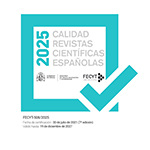The diagnosis of the culture’s crisis in Spain: from public cuts to the systemic crisis
Abstract
Since its invention in the fifties, cultural policy has been subject of analysis and reflection by Social Sciences. However, Spain, due to Franco period, has a number of distinguishing features as compared to Western European democracies. With the restoration of democracy, Spain acquires the dominant paradigm of a democratic cultural policy based on freedom, pluralism and the right to culture. However, after decades of democratic governments, diagnosis of cultural policy in Spain shows signs of systemic crisis, added to the impact of the global financial crisis at the beginning of the XXI century. In this context, scholars, using the Delphi method along with secondary sources, identify a set of social discourses and narratives that seem to function as solving cognitive resources in the artistic and cultural sphere and which, because of their empirical contrast, are not free of contradictions and aporiae.
Downloads
Article download
License
In order to support the global exchange of knowledge, the journal Arte, Individuo y Sociedad is allowing unrestricted access to its content as from its publication in this electronic edition, and as such it is an open-access journal. The originals published in this journal are the property of the Complutense University of Madrid and any reproduction thereof in full or in part must cite the source. All content is distributed under a Creative Commons Attribution 4.0 use and distribution licence (CC BY 4.0). This circumstance must be expressly stated in these terms where necessary. You can view the summary and the complete legal text of the licence.










